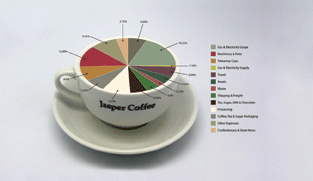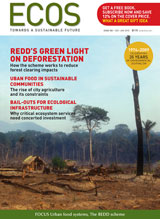
|
Published:
Leaving a good taste in your mouth
Sustainability has always shaped how Australian-owned company Jasper Coffee operates. But their recent achievement of 100 per cent carbon neutral status tops off their leading standard for successful sustainable business.
It took three years of specialist research, thorough investigations and a full sustainability audit to calculate the carbon footprint of the company’s entire operation, supply chain and assets – right down to the detergent used in dishwashing.
‘It’s all about trying to find alternative solutions to carbon problems and the overuse of materials,’ says Managing Director Wells Trenfield, explaining how they have cut down on energy, consumption and waste products.
In the factories, for example, a unique system from Brazil cools the hot coffee inside the roasting drum with a five-second jet of water, which then evaporates on contact with the beans and stops further roasting. At the same time as reducing water use, Jasper technicians have also accelerated the bean cooling process, saving further energy by increasing the size of holes in the meshed cooling tray.
When it comes to delivery, customers receive their coffee in foldable and returnable plastic crates; this reduces the use of cardboard and saves on recycling costs. Used coffee sacks are distributed to various dogs shelters and staff use chaff leftover from roasted green coffee as fertiliser in their gardens. Nothing is wasted.
As well as offsetting company car emissions through the Greenfleet program, Jasper Coffee has partnered with the Karnataka Renewable Energy Project in India to offset their greenhouse gas emissions through biomass power generation.
Agricultural waste from local farmers fuels the Karnataka power plant to produce a clean and sustainable source of electricity. By purchasing carbon offsets, Jasper Coffee is helping to create revenue for impoverished rice farmers and reduce greenhouse gas emissions in India by 30 000 tons of CO2 annually. The project is now returning around 84 million INR (AU$2.3 million) to farmers every year and, as an additional benefit, 500 new jobs have been created.
Finding the Karnataka Project took time and research. ‘It wasn’t just a product-based decision,’ explains Trenfield. ‘For me it was also a question of social responsibility.’
Guided by ethical, social and environmental considerations, Jasper Coffee is a founding member of the Fairtrade Association and was the first roaster in Australia to be certified organic in 1989. With the aim of securing a better deal for coffee growers in developing countries, 15 out of the company’s 36 coffees have Fairtrade and Organic certification and are shade grown. Cultivating coffee trees under an indigenous forest canopy helps to encourage a biodiverse habitat for native flora and fauna.
In a partnership with World Vision, Jasper Coffee has assisted coffee growers in the Yirgacheffe region of Ethiopia to achieve Fairtrade and Organic certification. ‘Getting the certification has changed their lives,’ says Trenfield, explaining how the Fairtrade guarantee of an above-market price has enabled the farmers to invest in training, studies in agronomy, business management and running a Fairtrade cooperative. ‘They are now empowered to make their own decisions.’
In northern Peru, Jasper Coffee supports, and has visited, the Café Femenino project, a cooperative where women own the land, harvest and sell their own coffee at a fair price. In addition, funds raised from two extra levies – one administered by the Café Femenino Foundation and one by Jasper Coffee – have been invested in training and leadership.
‘This project has brought self-esteem and self-respect back into women’s lives,’ says Trenfield. Café Femenino sells 25 per cent of their crop to Jasper Coffee, which is in turn the company’s biggest seller.
Jasper Coffee has recently won some notable corporate contracts because of its commitment to excellence. It now supplies coffee to 55 per cent of Australia’s domestic airline market and plans to take that further. The National Australia Bank serves Jasper product in its 800 branches across the country – a sound return on the investment in best practice.




